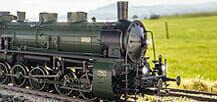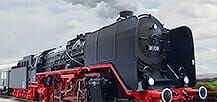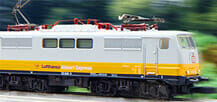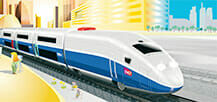"Simplon Orient Express" Express Train Passenger Car Set 1
Prototype: 5 different express train passenger cars of different types painted and lettered for the Compagnie Internationale des Wagons-Lits et des Grands Express Européens (CIWL) / International Sleeping Car Company, for the Simplon Orient Express. Included are 2 four-axle baggage cars, 1 six-axle dining car, 2 four-axle sleeping cars, each in a steel blue paint scheme. The cars look as they did at the beginning of the Thirties.
Most Important Facts
Sound demo| Article No. | 42790 |
|---|---|
| Gauge / Design type | H0 / 1:87 |
| Era | II |
| Kind | Passenger Car Sets |
Check with your local dealer Find Dealer
Highlights
- Anniversary of 100 Years of the Simplon Orient Express 1919-2019.
- mfx digital decoder for light and sound functions included in one baggage car.
- Red marker lights also included on this baggage car, digitally controlled.
- Factory-installed LED interior lighting, digitally controlled.
- Current-conducting couplers between the individual cars.
-
Product description
Model: The models are finely constructed with many separately applied details. The interiors are done in different colors. The cars have different car numbers. One baggage car has a factory-installed mfx digital decoder, for controlling light and sound functions as well as red marker lights. Retracted diaphragms with walkover plates folded up are included for end cars in the set. Only a close coupler in a standard coupler pocket is installed at each of these ends of the end cars. The doors on the baggage cars can be opened. All of the cars have factory-installed LED interior lighting and factory-installed current-conducting close couplers that can be uncoupled. Table lamps in the dining car are lighted and together with the interior lighting and the red marker lights will work in conventional operation and can be controlled digitally. The current-conducting close couplers can be replaced by current-conducting fixed drawbars included in the set. There is a pickup shoe for current pickup on one baggage car.
Total length over the buffers 117.5 cm / 46-1/4".This express train passenger car set can be lengthened with the 42791 express train passenger car set. The express train steam locomotive to go with these cars can be found in the Märklin H0 assortment under item number 39243. Compagnie Internationale des Wagons-Lits et des Grands Express Européens (CIWL) is a registered trademark of Wagons-Lits Diffusion (WLD), Paris, France. All rights reserved regarding reproduction. © Wagons-Lits Diffusion - France.
This car set can be found in a DC version in the Trix H0 assortment under item number 23219.
Find more Märklin explanation videos on our YouTube Channel
Spare parts for our articles can be found here in our spare parts search.
-
Publications
- Summer New Items 2019 - Product programme 2019/2020
-
Prototype information
Simplon Orient Express After World War I, the victorious powers were forced to find a new route for the Orient Express, since the terms of the Versailles Treaty forbade transit through German and Austro-Hungarian areas. Actually, only a route south of the Alps was considered, whereby the Simplon Tunnel between Switzerland and Italy played a crucial role. The Simplon Tunnel built in 1898 to 1905 (first tube) and in 1912 to 1921 (second tube) at 19.8 km / 12.4 miles was the longest mountain tunnel in the world until the end of the Seventies. On April 11, 1919, the brand new Simplon Orient Express ran for the first time from Paris across Switzerland through the Simplon Tunnel to Milan and further to. Initially, connecting trains ensured the connection via Zagreb to Belgrade. Starting in January of 1920 the Simplon Orient Express was able to run continuously to Belgrade and in the summer of the same year even to Istanbul (at that time still called Constantinople). In addition, there were now through cars to Bucharest. As another special feature, the Simplon Orient Express ran daily in the years between the wars. Its run began in the Paris station Gare de Lyon in the evening hours, after the through cars arriving from Calais with the "Flèche d´Or" ("Golden Arrow") (connection to the canal ferries from Great Britain) had been coupled to the train. It came to Brig via Dijon, Vallorbe, and Lausanne and then hurried through its namesake Simplon Tunnel, in order to reach the Italian Domodossola. The next morning it went on via Stresa, Milan, Verona, Venice, and Padua to Trieste. After Trieste came the second night run via Ljubljana, Zagreb, and Vinkovci to Belgrade. The through car to Bucharest was uncoupled in Vinkovci and then reached the Rumanian capital by avoiding Hungarian territory going via Subotica, Timișoara, Orșova, and Craiova. In Belgrade, the train received through cars depending on the day from the "Orient Express" reintroduced starting in 1921 as well as from Berlin, Ostend, or Prague. The Simplon Orient Express then continued its run via Niș, Sofia, and Svilengrad, until it reached the station Istanbul-Sirkeci the morning after the third night. In the Twenties and Thirties, the new Simplon Orient Express became the most luxurious form of transport for the Balkans, Turkey, and the Middle East, preferred by diplomats, artists, authors, and wealthy tourists. A remarkable sidebar story: In February of 1929, the French weekly "l´Illustration" reported about a violent incident. About 80 kilometers / 50 miles north of Istanbul, near Tscherkessköy, the Simplon Orient Express remained stuck in a massive snowfall for five days. Apparently, this event inspired the mystery writer Agatha Christie for her novel "Murder on the Orient Express". She herself was an enthusiastic patron of the train.
-
Digital Functions
Control Unit Mobile Station Mobile Station 2 Central Station 1/2 Central Station 3/2*
Mobile Station 2**Interior lights Marker light(s) Load area door Loading Operating Sounds 1 Dialog Dialog Dialog Dialog Dialog Operating Sounds 2 Snoring Conductor * New features of the Central Station 2 (Part No. 60213, 60214 or 60215) with the software update 4.2
** New features of the Mobile Station 2 (Part No. 60657/66955) with the Software Update 3.55
Warning
ATTENTION: not for children under 15 years
















